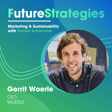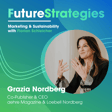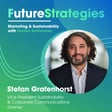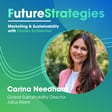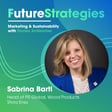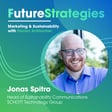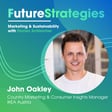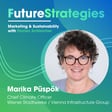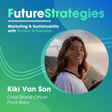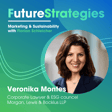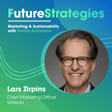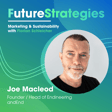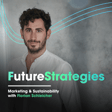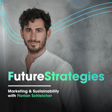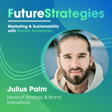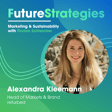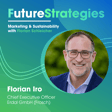Opening Thoughts on Curiosity and Ideas
00:00:00
Speaker
You have to be open, you have to be curious, you have to ask questions, you have to allow yourself to be silly. And I think that can be a bit intimidating in a professional context because sometimes you don't want to look silly, you don't want to say stupid things, but that's almost a premise to get to the place where you get good ideas.
Introducing the Future Strategies Podcast
00:00:20
Speaker
Hello, and welcome to Future Strategies. I'm your host, Florian Schleicher. You want your marketing to achieve goals and sustainable growth? You have come to the right place. In this podcast, I talk with marketing experts and share my own know-how on how to bring your marketing to the next level with a lot of inspiration and learnings, all without the usual hustle. So let's jump right into it.
Guest Introduction: Kalle Mill Jensen
00:00:49
Speaker
Today, I feel very honored to have Kalle Mill Jensen talking to me. Based in Copenhagen, Kalle Mill started his career as a co-founder of a platform spotlighting emerging artists across creative mediums. He later joined Under Armour as a product designer to help develop their fitness community digital ecosystem, only to then transition to Too Good to Go.
00:01:14
Speaker
He helped shape the creative and branding at the world's biggest initiative against food waste, growing from the sole creative to leading a team of 25 people supporting 17 markets worldwide. And now he's the director of Creative, Creating Solutions with Creativity.
Kalle's Career Journey and Impact
00:01:32
Speaker
Welcome to the show, my friend. Thank you so much, Florian. It's a pleasure to be here.
00:01:37
Speaker
So you and I worked together for two and a half years when I was head of marketing of the Austrian team. And I have to admit, you were one of my most favorite colleagues because you're both a creative branding as expert and one of the nicest and kindest people that I know. Florian, we are going to start the podcast with me shedding tears now. That was beautiful. Thank you so much. I can only say the same to you. It was always a big pleasure. Thanks for that.
00:02:07
Speaker
Thank you. So I was always fascinated by the broad range of ideas that you always brought to the table. And I particularly enjoyed our brainstorming sessions because they were always so easy going, open for fun interventions. And we also always had a space where we focused also on ideas that were really actionable. So before we dive a little bit deeper into what you're doing,
00:02:34
Speaker
Take me in a short journey. Why did you choose Too Good To Go as the brand you wanted to work with and to start also investing your heart into? Yeah, sure. So I think first and foremost that I have been doing a lot of different things in the beginning, but I actually had an opportunity, as you also mentioned in the intro, where I worked for Under Armour and as a product designer.
00:03:07
Speaker
is a very fulfilling experience too, because you are helping a lot of people to get to get healthier and in general, you know, whether it is starting to work out, getting back in shape or whatever it is.
Creative Role in Too Good to Go
00:03:22
Speaker
We had so many lovely stories from people about like, they were finally able to go on walks with their family again, or that they achieved this goal that they had set for themselves.
00:03:35
Speaker
And that was actually something that I realized was extremely fulfilling, that you're doing something that is contributing on a positive scale, you know, no matter how small or big it is that you're actually doing something positive.
00:03:49
Speaker
And then I was lucky enough to then also get the opportunity, then I took it to go fighting food waste, which is also doing something positive, right? So now I have this whole dream to be able to look back at doing different things along the way, but all in a positive context of helping the planet at least a little bit somehow. So that's where that initial sort of
00:04:16
Speaker
interest came from. And then I think as well that it was very new back then, right? It was a startup, so yet a very good idea. So I think I also saw the potential and really thought it would be interesting to be part of
00:04:33
Speaker
be part of that and be part of shaping it and especially from a creative point of view. So yeah, that was how it all started and to be honest now it's been over six years and I didn't expect that in the beginning but very happy to still be here. And it also sounds super fulfilling, like doing something that you actually believe in and where you can help first people to change and then also doing something good for the planet.
00:04:59
Speaker
No, exactly. And I think especially when it comes to food waste, the more you look into it, the more clear it is that this is something that we should do something about, right? If we talk about more than one third of all food in the world being wasted and just in general that the sort of
00:05:21
Speaker
The solution is quite simple. It's not like you need to get a windmill installed in your garden to do something positive, but you can actually, everyone can do it, right? When it comes to saving food, even at a slight inconvenience, we can all do something. So I think it's definitely fulfilling and still something that has been very fun to be part of also in a professional context too. So definitely. Cool.
00:05:47
Speaker
So you are the director of creative. So let's talk a little bit about creativity. So mainly your job is to come up with new ideas, to position to Good2Go as a brand, to run campaigns. How do you actually come up with those ideas? No, I think it's a good question.
00:06:09
Speaker
And I think, you know, um, I'm, I'm also still in the role. I think I'm, I'm kind of young and I got into the role rather young too. And I think that was actually a big positive when it comes to coming up with a lot of different ideas. And, and I remember some of the sessions that we've had together in the past, it's like very different ideas, right? And sometimes very out in the ideas. And I think.
00:06:34
Speaker
In a way, that was a benefit of me getting so early into this role because I didn't have that much, what would you say, experience of like, no, this cannot work and that cannot work. And I wasn't really scorched in that sense. And I think that's a benefit when it comes to creativity. So you have to be open and you have to be in a spot where, you know, when you are coming up with ideas, you have to look at opportunities and
00:07:03
Speaker
And, and that's really it. To be honest, I've been spending a lot of time trying to systemize, trying to think about how, you know, how and why can we get good ideas? But like, it's hard to really put it into a formula. It feels like it can come from anywhere. You can try out different techniques and sure techniques may help. Um,
00:07:27
Speaker
But I think it's hard to sort of say, OK, this is the formula. This is how you sit down and do it. But I know for a fact that you have to be open. You have to be curious. You have to ask questions. You have to allow yourself to be silly. And I think that can be a bit
00:07:44
Speaker
intimidating in a professional context because sometimes you don't want to look silly, you don't want to say stupid things, but that's almost a premise to get to the place where you get good ideas. So I think it's being okay with that sense of appearing stupid in front of everyone and saying some things, but then ideas inspire ideas. All ideas grow out of other ideas, right?
00:08:11
Speaker
So I think it has been about being open and then hard work, right? So basically,
00:08:22
Speaker
setting up certain quantities of
Exploring the Nature of Creativity
00:08:25
Speaker
ideas. So if we talk about three ideas, we have probably discussed 30, 50, 80 ideas before that, that were not as good. And trying to filter that, not from a, oh, this is a nice to have, but basically from a, this is something I cannot live without.
00:08:44
Speaker
So whenever there is an idea, I don't know, I have to do this pitch to Florian. I cannot wait to show it to you and see your reaction to it. Right. And then I cannot live without it. And then I choose to bring that forward. So there's a little bit of openness and a little bit of just hard work and smashing your head against the wall and being okay with that. Yeah. There were so many things in there already that I wanted to jump into, like this definition of creativity I once read.
00:09:14
Speaker
Creativity is the relationship between a human being and the mysteries of inspiration. So I think there's definitely some mystery part to it. I once asked my first creative director at an agency I worked at, how do you come up with those ideas? And he was like, you know, it's like breathing for me. It just comes to me naturally. And I think some people have a gift for that. Of course, there are things you can learn about it.
00:09:44
Speaker
And it's the same for me with strategies, with insights, they just pop into my head and then it's there. And I think the tricky thing is I'm not able to turn that off. Like I'm always taking work home because that's just how my brain works. It's not like an extra sheet that you just fill out. It's something that is started in your head and once it's there, it's just buzzing and it's going on and on and on and on.
00:10:10
Speaker
I know it's a gift and a curse, right? Because I think, to be honest, I'm the best and most creative past midnight. And that works so well with how we structured our society. But that's also when the best ideas will pop into my head. I won't even think about now I have to come up with an idea. It just happens. And I think a lot of good ideas come from that. A lot of very bad ideas came from that as well.
00:10:36
Speaker
But do you know this condition where senses are mixed, right? So you can see sounds or you can taste smells or whatever it is, right? It's funny because a lot of the cases for that, synesthesia, I think it's called, so a lot of the cases for that, people don't realize that it's a condition because they think it's the way for everyone, right? So I actually,
00:11:05
Speaker
So to the point of like, it's like breathing. It's like, I don't know, I think, I think everyone is, is, is creative. And I definitely think that that you can learn some of the things, but then I'm not sure if if other people have more ideas.
00:11:22
Speaker
Or if they're just not, you know, sort of like open to channeling it. I'm not sure. And I think like the thing that you said, we don't know how we all think. I know how I think. I don't know how you think. And it's the same with colors. Like describe to me what the color red is. I mean, we can talk about objects that look red, but who says that my red doesn't look the same as your red. So maybe there's a difference there.
00:11:49
Speaker
And I think it's so subjective also, like what we define. But there was another thing that you mentioned, which was about evaluating ideas.
00:12:02
Speaker
So you come up with a lot of ideas and then you have a team brainstorming and there are more ideas coming up. How do you evaluate what a good idea is? So for me, it's two things. It's one, I guess the more boring answer is it depends on the brief, right? So you're not just coming up with ideas for the sake of it, but to solve some sort of problem. And it's basically evaluating then, okay,
00:12:28
Speaker
Because then you've been open and you've been curious and all ideas have been good. But then you have to be the exact opposite, right? Then you have to be the worst critic of the idea. Try and look at all potential pitfalls. And you basically measure the idea against what you're trying to achieve with the brief. And that, you know, that's definitely not easy. I think I'm not personally married to any ideas, really. It's like it is what it is. Ideas will be killed.
00:12:57
Speaker
But and sometimes there is also, I think, an X factor in some ideas where it's like, OK, it doesn't fit the brief perfectly, but there is something brilliant about it. And you need to be the the judge of that. Right. And also the other part of it. So one thing is evaluating it against the brief. I think the other part is you need to establish some sort of philosophy around for yourself what a
Campaign Success: Date Labeling Impact
00:13:23
Speaker
good idea is. Right. So some personal criteria.
00:13:27
Speaker
that all ideas that you believe in, they have to stay in full. So I think that for me, no matter the brief, also some criteria that I try and make sure that all the ideas adhere to. And what's that for you? What is your personal criteria for a good idea?
00:13:47
Speaker
So so there are a lot of there are a lot of different a lot of different ones. I mean, as an example, one of them is that it has to be simple. Right. So you have to be able to explain what the idea is in a sentence. Otherwise, I have a theory that no one is going to pick it up. No one is going to be on
00:14:03
Speaker
to be understanding it, nobody is going to care about it. So it has to be something that's rather simple to get and to understand. So that's, for instance, one of the criterias where, you know, you can ask and you can also use that to sort of shape the idea in the end is that we can subtract something from the idea to make it stronger and to make it more pure. But but then again, I think I think creativity is is quite
00:14:29
Speaker
subjective, right? So I also don't think you can generalize a list and say this is the criteria that should work for everyone. I think it's a lot about personal preference and having some authenticity about your taste as well.
00:14:45
Speaker
Is there any campaign or idea of Too Good to Go that you are especially proud or happy about? It's quite difficult. I will say though, so I cannot take the credit for the idea, but I think that date labeling is a very good initiative. So a lot of confusion and a lot of food waste happens due to confusion of date labels. I think it's 10% of food waste that happens due to date label confusion.
00:15:11
Speaker
Yeah, exactly. On a household level, it's around 10%. Basically, people cannot understand the difference, and I understand why, between used by and best before, where used by is referring to safety. Best before is generally referring to optimal quality of the food product and not safety.
00:15:30
Speaker
So that's a bit confusing and it's good to go created this label that encourages people to look, smell and taste before they, before they throw out the product. So that's something, you know, the idea in itself, it's something that, that brings value.
00:15:47
Speaker
that helps people, you know, they, they will actually be able to be educated and to who'd at a later date and save money and all of these positive things. Right. So, so that's at least a campaign that I really like. And it's been, or it's not even a campaign in a way as well. It's more of an initiative. And then we have done campaigns around that initiative. Right. So, so that I would say is probably my favorite. I wish I could take all the credit for it.
00:16:17
Speaker
Let's talk a little bit more about Too Good to Go. So you mentioned already that ideas have to be simple in order for people to understand them. And I think simplicity is definitely one factor why people love and use Too Good to Go that much as a solution and an app. What else do you think drives the engagement so much and
00:16:42
Speaker
What does it mean also for the campaigns that you're running and that you're designing? I think a lot of it comes down to the general idea, right? Like the concept in itself is like very smart. The win-win-win that we talk about. You are able as a consumer to save money. You are able as a business to get exposure in and get some money for the
00:17:05
Speaker
food that otherwise goes waste and it all benefits the planet where food waste in general is a major issue. So I think that in itself has carried a lot for Too Good to Go, just the sort of ingeniousness of the idea. And I also think the
00:17:28
Speaker
discovery factor is also another thing. I don't know what you call it. So you can both discover new food stalls, but at the same time, you will also have your food packed in these surprise bags. So you don't know what you're going to get. So to use a sort of
00:17:46
Speaker
business term, right? You sort of gamify your everyday a little bit because you don't know exactly what you're going to get. I feel like that's exciting and that makes you want to go and discover it and try different places and that combined with the fact that you're doing something good I think has helped a lot. What do you think? Yeah, I think simplicity is something and I think that
00:18:13
Speaker
That's what we build our PR approach around is that
00:18:19
Speaker
People are frustrated. They see that we have a climate crisis, a climate emergency, news everywhere. Now we have a heat wave. Then you have like a month of thunderstorms and rain. So everything gets more extreme. You have all those news out there and it gets frustrating. Everybody feels like, okay, there's so much going on. What can I really do? And the cool aspect is then to give people something they can do every day
00:18:49
Speaker
that is part of the solution. So I think building on this level of frustration and an actual problem that people have in their everyday lives, that's part of the success too. Right. Absolutely. I think so. I think so. And again.
00:19:05
Speaker
Again, back to the win-win-win, right? That is, that is a part of that. And then you, with a lot of the other things you can do, I think they are often involving some sort of sacrifice. So less, less travels because your transportation will pollute or shorter showers or whatever it is.
00:19:24
Speaker
Whereas with too good to go, you're saving money and getting good food while doing something good. So having that positive aspect to doing something good, I think is also related to exactly what you're saying.
Marketing Psychology and Consumer Behavior
00:19:38
Speaker
And I just wrote a newsletter post about loss aversion as a psychological effect. And there was a nice example in there, which was if you go to a coffee shop and you order a coffee to go, usually what happens is you get a discount if you bring your own cup. But not a lot of people are doing that because it does not sound that appealing. But what if it were the other way around and you would say,
00:20:06
Speaker
A coffee is always discounted, except if you don't bring your own cup, then you need to pay an extra. And suddenly people are like, okay, I should really bring my own cup because otherwise I need to pay more. It's exactly the same, but it sounds different.
00:20:24
Speaker
It's so important to consider those psychological effects also because you can really frame what people are doing and nudge them into the right direction. Yeah, absolutely. I mean, I love.
00:20:38
Speaker
Psychology, I studied it in school and I have been into it ever since. And I agree, I think it's so interesting. And I think when it comes to climate change as well, that's, you know, I think a good exercise for all of us of like, how can we make this understandable? How can we make it so where we truly see the effects and what we have to do about it? And not talking about you have to have less
00:21:07
Speaker
less flying, less consuming, nobody likes that message. And we need to shift away from that. And that actually brings me to my next question is like, how can creativity play a role in creating a more sustainable future?
Creativity and Sustainable Futures
00:21:24
Speaker
And maybe now shifting away a little bit from Too Good to Go, because the whole purpose of the organization is creating a more sustainable future. But what can creativity or what can listeners who are now saying, okay,
00:21:36
Speaker
I really want to do something. How can creative ideas help you to shift
00:21:44
Speaker
a target audience or a product into a more sustainable way? I think in general, creativity is also envisioning a future that's not there yet, right? So it's a lot about, okay, and I think that's the interesting part about it, actually, because you're sort of saying, okay, we can maybe shape reality in this or this way. When you're doing a brainstorm, you can take it in this direction or in that direction.
00:22:09
Speaker
And so I think there are some key components to thinking about creativity that can also help envisioning what is the future that we want to live in, right? And not, you know, so I think whenever we talk about the future, and we talk about innovation, and we're talking about how we want to build our society, I think creativity is an integrated part of that inevitably, right? Because you have to look at a future that's not there. And I don't think you can do that without really thinking creative about it at the same time, by definition.
00:22:38
Speaker
Yeah, so obviously, probably a lot of ideas that Tuku2Go has executed are your favorites, but what other brands do you actually look out for inspiration? So I think it can really come from anywhere. I don't have specific brands where I'm really like, okay, I have to follow their every move in what they do, but I do have
00:23:02
Speaker
Of course, I have certain initiatives and certain campaigns and certain things. I'm like, that's just, you know, it's so beautiful. It's like, like, which one? I don't know if you remember, but Lacoste, a couple of years ago, did a campaign around endangered animals. So I
00:23:24
Speaker
So I'm not sure that I remember all the details exactly, but I'll try and tell it as I remember it. So they have had their crocodile logo on the chest. And that's how you know the Lacoste brand in general, when it comes to what they stand for, what they are. And they have been so loyal to their crocodile for, I think it's from the 1930s, the Lacoste brand, right? So it's been there. That's how every single person knows it.
00:23:53
Speaker
And then to spread awareness around endangered animals, they then changed the Lacoste crocodile to the different endangered species that we have, making them limited edition. So based on how many animals would be left, that would also define the supply of that polo or that t-shirt and then everything then going to charity to help the endangered animals. Right.
00:24:21
Speaker
That's such a great idea because it's so simple again and you immediately build a connection between, okay, how many polos are there compared to how many tigers are there still? Exactly. And I think that another one of the, you know, you can have that it's very simple and it is that there is also the factor that Lacoste is ultimately the only company that could run
00:24:46
Speaker
the only brand that could run that campaign right now. Any other clothing brand, it won't have the same effect because they saw the connection, they saw the brand, what they have, what they stood for, and then they built on top of that to spread a positive message. And then for me, it's a brilliant thought and it's very, very simple. So that's one
AI in Creativity and Societal Impact
00:25:04
Speaker
that I like. And I really aspire as well with the different campaign work that we do to do something that
00:25:11
Speaker
only we would be able to do as well. So it's easier said than done, I think. One last big topic that I want to discuss with you is I had a podcast recording also with Cordula from The Next Web. We talked a lot about AI. I think AI and sustainability, those are like the biggest topics out there right now. One is
00:25:36
Speaker
Probably a bubble, the other one, a big threat. How threatened do you feel as a creative by AI? That's funny. I don't feel threatened at all. Maybe that's stupid, you know? So I'm not saying that AI cannot be scary or frightening in general. I'm just saying as a...
00:25:56
Speaker
As a creative, I think we should rather look at the opportunities that it brings us instead, right? Like, how can we integrate it in our workflows? And I sometimes have questions as well about, is it okay if we use AI? And I'm like, of course, like, please, if it builds a better product for us, and if it saves us time, then please let's go for it. And I try to integrate it as much as possible.
00:26:21
Speaker
in what I do and try and do that for the team as well. So, so, you know, it can help with whether it's brainstorming or or whatever it is. In what kind of way have you used AI? Is it more like on the text generation or more image generation? So for me personally, it's been both. So as a creative.
00:26:43
Speaker
I don't know if you ever figured it out, but I'm terrible at drawing. No, I never saw that. I never have seen you drawing, no. You're lucky. It's a good cat secret. I'm decent behind a computer, but without it, I'm completely useless.
00:27:04
Speaker
Basically, it can be for text generation, but also when it comes to storyboarding, now instead of searching through stocks or trying to draw out what you're looking for, you can set up the exact scenery that you want right through AI and not using that a lot. And it doesn't take a lot of time and you really want to convey an idea, right? And it's really good at that. And it's really good at setting a mood and creating an atmosphere and something that would otherwise take
00:27:32
Speaker
a very long time to set up. So for me, who've always been having to work around not being able to do good, very good drawings and drafts, it's a gift. And I'm just so, I don't know, I'm so excited about it, which is also why I think I'm not really in the mindset of being extremely frightened by it, at least not yet. Now I'm very happy about it. Yeah, I get that. I also think there is huge potential there.
00:28:01
Speaker
I think it's the same as with every tool, you have to know how to use it. You can use a knife to spread butter on your bread, or you can kill someone with it. So I think, again, it's the same with social media. We had to learn how to use it as a tool.
00:28:21
Speaker
And now we see it can be used to destroy democracies. And it can also be used to connect with some friends on the other side of the world. And I think the same applies to AI. It's just we need to learn something new here. And I think that also frightens a lot of people because new things are always scary first. But I also feel like a lot of
00:28:43
Speaker
The talk that is now centered around AI feels like distraction from the actual problem, which is the climate crisis and creating a more sustainable future that we should focus on. I think it's an interesting time to live in, right? Because of the scale of all of these topics that we're talking about, whether that is social media or climate change or AI, it's like everything is developing and spreading
00:29:12
Speaker
as at such a such a speed right and such a magnitude that we cannot really catch up with it almost and that I think is very frightening that I think is very intimidating I think when you look at social media right now as you rightly say it's the ultimate dystopia and utopia at the same time right connect with friends in seconds around the world but again you can also have everything bad that it brings along as well
00:29:38
Speaker
And do we really know what to do with it? I'm not sure. I'm not sure. So it's definitely frightening. And all the talk about being positive about AI is more on a small scale kind of daily day. Of course, all of these challenges are huge and we should definitely watch out for the development of them, I think.
Podcast Wrap-Up and Book Recommendations
00:30:01
Speaker
So now we went super deep.
00:30:04
Speaker
I could go on for hours talking with you, but everything good has to come to an end. So I would like to finish up with the three final questions. First, what is good marketing for you in three words? I will say remarkable value giving. Is that one or two words? We can say that it's one. And then I would say, I will say creative. Nice. What's the future of marketing?
00:30:32
Speaker
Uh, okay. You thought, I thought you said it was easy question. It's like, what is the future of marketing? So I think we came from a place where it was more disconnected between, uh, the company and the brand and the consumer. I think there will be way more in general interaction. And I think the much higher stands for much higher sort of, uh, standards for brands to, to live up to. Uh, so it will be as about everyone shouting, I have the best product.
00:31:01
Speaker
and more about the values that you holistically believe in as a company. And I think marketing is a way to promote that vision, that company and that brand, right? So I feel like brands that will survive in the future, I feel like will be holistic and it will be hard for them to be doing a lot of shady stuff in the background while promoting a product or a service, right? It's like everything sort of has to work together and marketing is a way to bring that out there.
00:31:30
Speaker
And final question, I always ask my guests here, what book have you read recently that you would like to recommend? I really love sapiens. If you haven't read sapiens, I would say everyone should beat sapiens in general. Talking about our civilization and how it came to be, I think that's very exciting.
00:31:55
Speaker
I've been reading a lot of Japanese authors, different ones. I think it's absolutely incredible. They have this sort of very simple but poignant writing style. I'm reading that for fiction.
00:32:08
Speaker
and very descriptive in terms of like settings and moods and atmosphere. So it's more like watching a movie. I feel like a lot of these books whenever you get into it. I had that when I read from Murakami 1Q84. Yeah. I really felt like I was there. Yeah. And just thinking about it as well. I'm thinking about certain scenes where it's almost almost almost feels like I was I was part of that scene as well. So and then I would say the kite runner.
00:32:39
Speaker
What's that about? So it's based in Afghanistan and it's about, you should go read it. It's an amazing, beautiful story about growing up there and the relationship between two kids growing up in that place.
00:32:57
Speaker
I think that as well is such a beautiful story. It was like something that I just, you know, these types of books where you just somehow think about them ongoing. And that was, that was definitely the case for this one. Nice. I checked that out.
00:33:12
Speaker
So I've been very much looking forward to the session with you, not only because of the recording, but also every conversation with you leaves me inspired and happy. So that's how I feel right now. Thank you very much. No, thank you, Florian. Thanks for all the nice words as well. I can only say the same thing to you. It's always a pleasure. It's been a pleasure likewise. I love you and I hope to see you soon. You too. Ciao ciao.
00:33:41
Speaker
Thanks for listening. Do you already know the Simple and Sustainable Marketing Academy? This is my new four-month learning format for founders and aspiring marketeers. An interactive learning journey in a live group setting. All for an unbeatable price.
00:33:59
Speaker
You can find all the details on my website future-s.at. I'm always happy to get your feedback and if you have enjoyed this episode, please give me a rating wherever you're listening. And until next time on future strategies.

